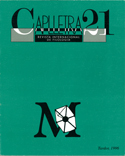Una alternativa tripartida: la varietat tradicional, la varietat estàndard catalana o la varietat estàndard espanyola
DOI:
https://doi.org/10.7203/caplletra.21.7342Keywords:
educació, català, varietat tradicional, varietat estàndard catalana, varietat estàndard espanyola Abstract
Abstract
The purpose of this paper is to show how the Catalan spoken in the south Valencian region is reacting to the effects of the linguistic normalization process that was initiated more than ten years ago. Basically, this process concentrated on two areas: on the one hand, education, where Catalan is present either as a compulsory subject, or as the language in which the whole teaching takes place; on the other hand, the spreading of several mass media which more or less use the language. We shall try to describe a few linguistic phenomena, phonetic as well as morphologic and lexical, through a survey carried out among various age groups and, in the case of small children, considering their school situation concerning Catalan and their family language. In this way, we shall grasp the predictable generational differences, the origin of which we shall try to find out, especially in order to relate the fact to the new sociolinguistic situation.
 Downloads
Downloads
Downloads
Published
How to Cite
-
Abstract435
-
PDF (Català)122
Issue
Section
License
Authors submitting work to Caplletra for publication must be the legitimate holder of the usage rights. Legitimacy for the purposes of publishing the work must also include images, tables, diagrams and any other materials that may complement the text, whether they are the author of such material or not.
Copyright: on publishing their work in the journal, the author grants Caplletra. Revista Internacional de Filologia usage rights (reproduction, distribution and public communication) for both the paper printed version and for the electronic version.
All work published in Caplletra is covered by the Creative Commons license type Attribution-NonCommercial-NoDerivatives 4.0 (CC BY-NC-ND 4.0).
RESPONSABILITY
Caplletra. Revista Internacional de Filologia does not necessarily identify with the points of view expressed in the papers it publishes.
Caplletra. Revista Internacional de Filologia accepts no responsibility whatsoever for any eventual infringement of intellectual property rights on the part of authors.






